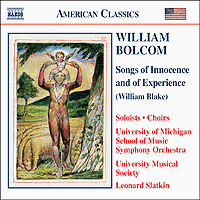Along with his other pieces for voice, Bolcom's operas reflect a keen, creative mind in love with the possibilities of the human voice as a means of communication. Why, then, has his largest work for voice taken so long to be recorded?
Although not by any means an opera, Bolcom's musical settings for William Blake's Songs of Innocence and of Experience offer a tremendous amount of vocalism from soloists operatically trained and otherwise. Composed in a kaleidoscope of shifting styles, from modern techniques to Broadway to Country/Western, the work has now appeared on disc, courtesy of Naxos (and the cooperation of the composer's professional home, the University of Michigan Music School). Lasting around 140 minutes and spread over three discs, Bolcom's Blake settings inundate the listener with what the composer calls (in a booklet essay) a "synthesis of the most unlikely stylistic elements," and the result is fascinating, exciting, and perhaps ultimately, somewhat frustrating.
The fascination is prompted by Bolcom's extraordinary grasp of a cornucopia of musical genres. From the opening orchestral explosion, marked by strong dissonance, the work glides in and out of musical styles with commanding confidence. There are country fiddles in The Shepherd, soaring soprano lines over a complex orchestral background in Earth's Answer, and lovely, hymn-like choral pieces such as The Little Girl Found, while the concluding piece, A Divine Image, lays down a rock-flavored reggae beat. With only two of the 55 tracks being over 5 minutes, and many under 90 seconds, no listener impatient with any one particular compositional mode has long to wait before a different one appears.
The excitement is generated by the sheer energy and dedication of the huge performing forces gathered for this recording project. The singers range from professionally trained voices such as Christine Brewer to Nathan Lee Graham, an actor/singer who declaims The Chimney Sweeper and provides the Broadway-type rock voice for A Divine Image. Conductor Slatkin leads the University orchestra through some thorny, though always expressive, orchestral passages, and also guides the more "naïaut;ve" musical settings with enthusiasm and not a hint of condescension. Unfortunately, the recording does little favor to the electric guitar or rock drums, which have the cheesy feel of 1960s or '70s Broadway attempts to sound "hip."
And that's where the frustration starts to creep in, especially with repeated listening. For amid this wild burst of creativity, Blake's creation wanders in and out of focus. When the huge choral forces are singing out, or the soprano voices (which also include Marsha Brueggergosman, a new and exciting artist) soar high, Blake's words become almost incomprehensible. As a result, it is only in the simple settings that Blake's poetry can be fully heard, and this tends to overemphasize the "naïve" quality of the poet.
When the work ends with A Divine Image, all that is worthy and questionable about Bolcom's achievement becomes evident. First there is a transitional passage of contemporary orchestral texture, and then the off-kilter beat of a reggae song begins. It's a decent tune, but as the concluding piece, it offers no musical sense of resolution or restatement.
The question becomes then, how successfully has Bolcom achieved his goal of a "synthesis of the most unlikely stylistic elements." Ultimately, the differing styles are segregated in individual settings. Most of the denser orchestral passages come as transitional pieces. The simpler music tends to be self-contained. Perhaps Bolcom wants to heal the divisions between "serious" and "popular" music that have widened so dramatically over the last century or so. Blake's Songs of Innocence and of Experience, with its blend of sometimes naïve form and language in expressions of deep, complex themes, provides ample opportunity for Bolcom to employ all the contrasts and contrary impulses of modern orchestral and folk music. Whether Bolcom has achieved his goal or only provided a mix of styles without bringing them all into a cohesive whole, each listener must decide.
But spending time with Bolcom's Songs of Innocence and of Experience is sure to provide listeners, no matter how they decide the above question, more than enough excitement and fascination to make up for any perceived frustration. Naxos deserves commendation for making this work available at last.
Chris Mullins
